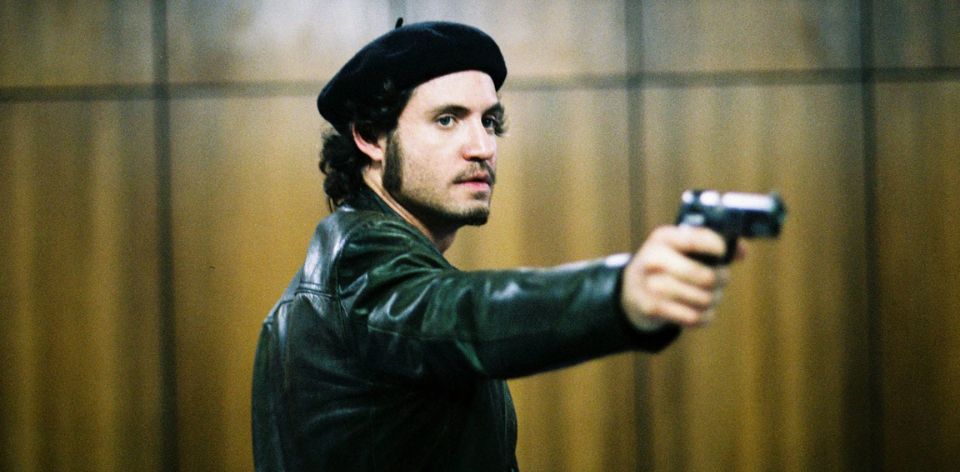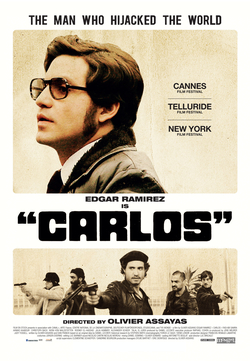Telling the story of the man named for Vladimir Ilyich Lenin and immortalised as Carlos, the film that bears his assumed moniker explores events over a twenty-five year period ranging from his initiation into the world of terror to his eventual, inevitable capture. As we meet him as a youth (played by fellow Venezuelan and The Bourne Ultimatum actor Édgar Ramírez), the audience is acutely aware that his journey will be one filled with power and peril, with his infamy increasing as he traverses the globe.
From Beirut to Baghdad, London to Libya, Aden to Algiers, and Sudan to Syria, his dastardly and devious deeds swept across Europe and the Middle East, with the likes of Paris, Vienna and Brussels in between. Earning praise from colleagues and scorn from superiors, and inspiring fascination from the press and determination from the might of law enforcement on his trail, Carlos aspired to the life of a revolutionary, but it was his acts as a terrorist that were more commonly seen.
One person’s terrorist is another one’s freedom fighter, depending on what side of the fence you are sitting on, although the media and political frenzy over terrorism since the attack on New York’s World Trade Centre in 2001 has made the issue even more black and white. In it in this environment that Oliver Assayas’ Carlos emerges, following a deuce of films by Steven Soderbergh on Cuban revolutionary Che Guevara, and its politics remains ambiguous. Just as much a comment on the nature of celebrity in the modern world, with Ilich Ramírez Sánchez (aka Carlos the Jackal) becoming one of the world’s first celebrity terrorists, the film is seemingly attempting to demystify the man behind the infamous attacks on the OPEC summit in 1975.
The film begins with a disclaimer, professing the fictionalised nature of the story and the guesswork involved in many of the relationships in The Jackal’s life. Indeed, the convicted man himself objected to the release of the film, claiming that the screenplay was full of “deliberate falsifications of history, and lies” and his legal team felt it may harm his future chances of appeal. Although all history is subjective, and cinema by its very nature is an interpretation of that history, this statement immediately throws into doubt any of the authenticity any of the elements of a story already shrouded in mystery. Given so many interpretations have already graced every medium known to humankind, one begins to wonder what the point of this lengthy new version might be.
Few films have seemed as simultaneously lengthy and as rushed as Carlos. Although cut down from the gargantuan 330 minutes that constituted the mini-series, and the screenings in its entirety at Cannes and other film festivals last year, the pacing of this 165 edited version is way off. Taking its sweet time getting up to the OPEC summit, the last half of the film is a chaotic descent into mediocrity (both for the character and the film), although much of this is in the editing.
Take for example the character of Lana Jarrar (Razane Jammal), Ramírez Sánchez’s second wife. She appears briefly as a new recruit, seduced by Carlos. We only see her a handful of times in this film version, the last time briefly complaining about the life she is leading, and one gets the impression that there was much more of this character development in the longer version.
Despite a strong performance from Ramírez, by the end of the film we are still no closer to understanding the motivations of young Ilich Ramírez Sánchez in becoming an almost desperate criminal. It seems that even behind bars with a highly studied career, Carlos the Jackal is as much of an enigma as ever.
The Reel Bits: An ambitious attempt to take a more holistic approach to the life of The Jackal, hamstrung in this theatrical version that is literally half of its originally intended length. The footage is noticeably absent, although given the pace at which the second half of the film drags, audiences may be grateful for Carlos Lite™.
Carlos is screening as part of the Alliance Française French Film Festival 2011.






